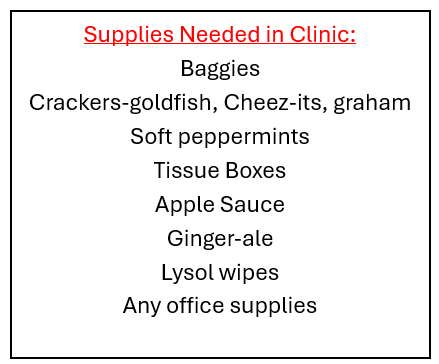Clinic
Ashley White, Nurse
678-494-7636
2025-2025 School Year:
• Daily Rx medications needed during school hours require a provider’s signature. Please print the Authorization to Give Medication form and take it with you to your appointment prior to the start of school in August. You must bring this form signed by the provider in the prescription bottle with the correct prescription label to the clinic. Prescriptions not labeled or with incorrect information cannot be accepted.
Authorization To Give Medication Form
• Over the counter medication, such as Tylenol, can be kept in clinic with the authorization to give form signed by the parent. A provider's signature is only required if over the counter medications are given more than 10 days. Cough drops are the only medication that elementary students can keep on their person. Please sign and return the form below.
• Emergency Asthma, Seizure and Allergy medications can be kept in the clinic if the student has an updated action plan along with the appropriate completed authorization forms for medications. Care plan forms can be found on the link below. Rescue medications are required to be provided by the parent/guardian. We call 911 for any emergency.
Asthma, Food/Allergy, Seizure, and Diabetes Care Plan
• Diabetic students are required to provide updated DMMPs each school year. In addition to doctor’s orders, the appropriate authorization forms for medication administration, and management supplies need to be provided to the clinic at the start of the year and restocked as needed throughout the year.
New authorization and care plan forms are required each new school year before any medication can be given. If you have any questions, please feel free to reach out. Please keep your child home if they have a fever, vomiting, diarrhea, rash, eye infection, lice, or a recent hospital stay. They need to be free from these for 24 hours before returning from school. Thank you all for your continued support!

Important links for forms next year:
Medication forms and letters link
